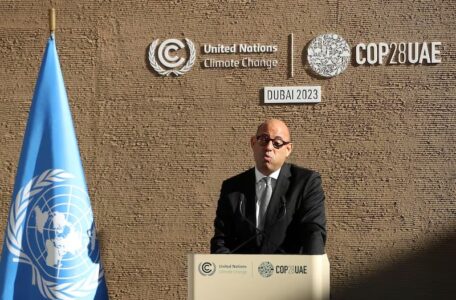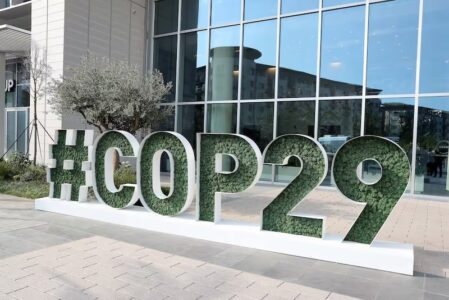The UN’s climate chief has told politicians in Africa there is a “gold mine of human and economic benefits” awaiting them if they deliver on what was agreed at Cop28 in the UAE.
Simon Stiell said more jobs, better education, cheaper energy and healthier cooking could result from Africa’s “greatest opportunity” to lift people out of poverty.
He blamed an “epidemic of underinvestment” for thwarting Africa’s potential, as the world looks to Cop29 in Azerbaijan this year for a new deal on finance.
If global warming goes unchecked, Africa will be trapped in an “economic sinkhole” marked by famine, inflation and forced migration, he warned.
His speech to the African Ministerial Conference on the Environment in Abidjan, Cote d’Ivoire, comes as the continent prepares to go into battle for more funding at Cop29.
Last year’s Cop28 summit in Dubai ended with landmark agreements to move away from fossil fuels, treble the world’s renewable energy firepower and double energy efficiency.
Some developing-country delegates had raised concerns that phasing out fossil fuels would stifle economic progress.
“I recognise these are big commitments, particularly in regions focused on development. But delivering on them will unlock a gold mine of human and economic benefits,” Mr Stiell said on Thursday.
“Cleaner, more reliable and affordable energy across Africa. More jobs, stronger local economies, underpinning more stability and opportunity, especially for women.
“Electrification and lighting at night in the home means kids can do homework, boosting education outcomes, with major flow-on productivity gains driving stronger economic growth.”

Fighting climate change with policies that also promote nature, biodiversity and land restoration will “drive progress” across the UN’s 17 anti-poverty goals, he said.
He said going green “can and should be the single greatest opportunity for Africa, to lift up people, communities, and economies, after centuries of exploitation and neglect”.
Money shortage
However, the needs of developing countries are estimated at almost $6 trillion by 2030 and previous efforts to raise money have fallen short.
Negotiations on a new finance deal at Cop29, which begins in Baku on November 11, have been narrowed down to seven main options.
One would set rich countries the goal providing of $1.3 trillion by 2030, while another would insist on at least $440 billion in grants rather than loans. A third would expand the list of donors to polluters to outside the traditionally developed world, which could mean China.
African delegates should go to Cop29 with a focus on securing direct grants, said Josefa Sacko, an African Union commissioner for the environment, before the talks in Abidjan.
Climate change could knock five per cent a year off Africa’s GDP, with “the poor, women, and the most vulnerable and marginalised populations” bearing the brunt, she said.
Figures from the International Energy Agency show Africa is set to invest just $43 billion in clean energy this year, a fraction of what is being spent in China, Europe and North America.
Mr Stiell said renewable energy investment “needs to grow at least fivefold” by 2030.
Africa also lacks funding to step up resilience against floods, droughts and other anticipated effects of global warming.

The World Meteorological Organisation warned this week that more than 100 million people already in extreme poverty will be exposed to droughts, floods or extreme heat within a few years.
It said African countries faced “disproportionate burdens” and were typically spending almost 10 per cent of their budgets to respond to climate extremes.
“African nations’ vast potential to drive forward climate solutions is being thwarted by an epidemic of underinvestment,” Mr Stiell said.
“Cop29 in Baku must signal that the climate crisis is core business for every government, with finance solutions to match. Nations must agree a new international climate finance goal, and ensure that it is grounded in the needs of developing countries.”
Source: https://www.thenationalnews.com/climate/2024/09/05/gold-mine-of-benefits-if-africa-embraces-cop28-vision/





